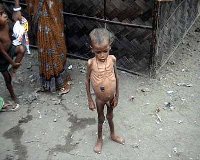Some have asked why I chose ‘The Schamberton Foundation’ as the title of my blog, so on to the explanation... Reality, and life itself, is unfair. Some are born rich, some in the upper social classes, some in middle-class families, some in the poorest places in a rich country, and others in the poorest places in poor countries. Poverty is relative to the system of reference; in countries such as the USA or in Western Europe, poor people have many governmental subsidies, have access to excellent public hospitals, and are capriciously accustomed to the idea that is their right and is the government’s duty to take care of them. This is definitely not the case in poor countries, where a really poor person is someone who everyday strives for survival, in precarious conditions of living, who are subject to illnesses that if it weren’t for their limited access to an appropriate health care system they would have cure, and with little or no aid at all from the government. As true as it is that life is unfair, it’s also needless to say that one of the most inherent attributes of human nature is selfishness. To provide a massive well-rounded education with an emphasis in moral and ethical values, especially in rich countries, could be the solution to such a problem as they would probably be compelled to do something about poverty, but this is simply unrealistic; also, perhaps, the media could recognize their role in society, which is not only to inform, but ultimately to educate, and they could well use their means and power to reach to every corner of a nation and educate the population by creating some sense of empathy and awareness of other peoples of the world; they could show them how harsh reality is in some places, and compel them if not to donate their money, at least to better appreciate the condition of their life. They would soon realize how ridiculous they are when getting depressed for irrelevant problems and complaining they are miserable because they can not go on vacations, afford a car or even new clothes… but again, even though this is done by a few media sources such as the BBC news which is doing a pretty good job on the issue, this also is probably unrealistic. I am convinced the media is largely responsible for the society's education, and it's an unfortunate fact that, in general, they are indifferent to their role and just publish what generates sales. It is not fair that our lives are conditioned in such a highly manner by this kind of geographic luck, and even though this is unavoidable, we, especially in the west, have the possibilities that with effort and determination we can very much open our way through the difficulties that we might encounter, and climb up the social ladder to get to where we ‘reasonably’ want to. Social mobility in these rich countries is much more flexible; the opportunities are at our reach, and we just need to discover and know how to make use of them. However, these same opportunities are not available in poorer countries, where this movement up or down the social strata is much more rigid and difficult, and where external factors so powerfully condition the life of a person that any effort to succeed or modify their highly probable predestined future results in vain. I do not share the view of helping those in need by giving away millions of dollars in food as this just distracts and diverts from the real solution to the problem; charity is not the solution, and just prolongs the misfortunes and sufferings of the poor. Moreover, many times this squandering of money is used as publicity, in where the ‘charitable person’ does not really want to become engaged with the problem and spend time in finding a solution, but gives away his extra money to consecrate himself, expecting others to do the humanitarian work – note himself could well be applied to corporations and even nations/governments. Education is necessary for the long-term development to address these needs. An admirable initiative is that of MIT’s media lab currently focusing on the development of the ‘100-dollar laptops’, with the fantastic idea of applying a hand crank to the computers for providing power, in places where electricity is undependable or unavailable. Clearly, 100 dollars is still very expensive for a vast amount of people, some living with just 1 dollar a day, but it is definitely a step forward in the right direction. However, it is definitely not enough; in fact, no poor child is in a condition to study, even if that education would be available around the corner, if his main concern is whether he will be fortunate enough to eat something that day or not. In these extreme cases, education would do very little. For instance, these cases generally occur in places in where there are not the necessary institutions to promote education and provide some kind of guarantee that if a person studies, he would actually find a job and a consequent better lifestyle. If some non-for profit organization goes, say, to some poor country in Africa, and starts educating the poor, what they would simply get as a result is educated poor, if this is not accompanied with a restructuring of the country’s institutions. Not only education and starvation is a problem, but it is way too common, especially in Africa, family situations in where both parents infected with HIV die, and their children are left orphans, with no resources, vulnerable to the society’s external pressure, with no guidance whatsoever, and in many cases subject to exploitation. There are many other major problems far from being solved, such as the access to pure drinkable water, efficient methods of producing energy for domestic consumption, the shrinking of distances in the emerging countries by the development of transport and the implementation of the corresponding infrastructure, health problems that could actually be reduced by spreading awareness and educating the population, the construction of shelters to protect them not only from the weather, but also from insects transmitting diseases, to mention only a few. All these problems need to be addressed in order to make a difference. Is this being done? Yes; is it enough? Of course not. The quality of the help given should be considered; for instance, in the case of food, if there is no other option but to send it to the place in question as for some reason it is not possible to produce it there, I believe the way to do it is by making the poor population participate in some way. In effect, it is not the same that someone in need get the help from someone else or some non-for profit organization that practically feeds him in the mouth, than that someone in need actually worked for his nurturing. In the first case, the poor person is nurtured by someone, and as a subtle result, he is aware of his condition of inferiority and this only helps in making him feel miserable and do nothing to change his condition. In the latter case, if the person works for his own nurturing, undoubtedly, this would have a tremendous positive psychological effect on the person, and would result in a boost of confidence as he would know that he is responsible for his well being. I personally like the idea of installing a small production facility in a poor place with the intention that it would ultimately be run by those living there; say, a small bakery producing highly nutritious bread and ran by those living near the place. The requirement to keep it working would be perhaps a monthly supply of flour, the necessary ingredients to make bread, which could very well come from some other parts of Africa, and energy to bake it. To begin with, I guess some propane tanks would suffice, though in the long run the source of energy could very well be obtained in situ, using solar or wind technologies depending on the geographic characteristics. Clearly, this would require a good amount of initial investment; however, it would aim so that in the long run it could reach a certain level of self-sufficiency, as they would just need to be regularly supplied with the necessary ingredients to continue producing bread. Therefore, the price of this maintenance would be comprised by the cost of this ingredients plus the cost of shipping them to the site. Would this highly protein bread contain other vitamins that people don’t include in their daily diets? Would there be enough security to develop such a project without the risk of being robbed? Several factors would have to be considered. This would be suitable for those places that suffer the most, in where people would be willing to work just to produce the food for their survival, and not get paid in return. Don’t expect that this bread would be commercialized, but could be traded and exchanged for other services. A certain level of organization would be required in the place, in where those involved would be expected to know their responsibilities. Once this is achieved, I really don’t see why this wouldn’t work out. Again, this would necessarily require a constant flow of money for the supplies in order for the initiative to keep going, but this is way more preferable than spending this money in buying the food and giving it away. I guess all I am trying to say is that money and effort should be spent wisely, in long-term sustainable projects, rather than in short term blatant and cynical attempts of rich governments to fight against poverty. Why is it that rich countries and governments don’t encourage this kind of help? Is there any doubt that poverty is necessary and has its useful role in every society? In an attempt of self-criticism, I guess I am in the age where I think I can be anything that I propose to, and that can actually contribute in the decrease of these societal inequalities. I might have on this matter kind of an idealistic view, but I think that anybody can contribute in as little or as much as his own possibilities enable him. As a matter of fact, aiming a little high is preferable than having no ideals and standing still. Not necessarily do philanthropists and altruistic people need to have millions of dollars to give in aid in order to start helping the misfortuned; I would say that most of the people reading this is so much more fortunate than most of the world’s population, and we are all in a position to contribute in the struggle against poverty. Even one dollar a day can save the life of a child somewhere in the world, so it is potentially possible that we can do something about it, the key matter here is how predisposed we are to do so… Time and determination will say how much I will actually be able to accomplish, but I believe these are great things for which to struggle for; it is a huge motivation not to satisfy ourselves with what we have, and playing by the rules, if our goal is noble and sincere, do all what we can to get to our objective not letting others with narrower minds and vision discourage us nor be a block in our road. The Schamberton foundation is nothing more than a fancy name that represents in a personal manner all these ideals. In the future, should it be a name that does not give me recognition in return, I think this would be immaterial… I don’t know if this particular ‘project’ is actually practical, and I am sure it would be difficult to implement. There must be places where this is already being done, though I don’t know about them and it is clearly not enough… For now, this is just a self-motivating and entertaining idea for the constant search for equilibrium among the unfair predestined inequality among people around the world.


Saturday, September 30, 2006
The Schamberton Foundation
Posted by
schamton
at
Saturday, September 30, 2006
13
comments
![]()
Subscribe to:
Comments (Atom)
